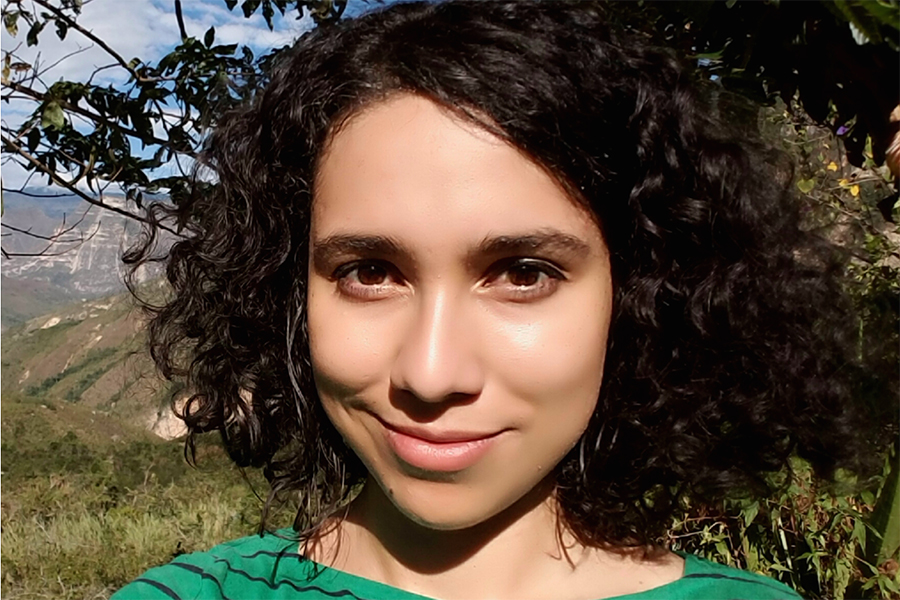Faculty Profile: Elizabeth Barrios

In college, assistant professor of Spanish Dr. Elizabeth Barrios decided to take a Latin American literature course because she thought her native Spanish was getting rusty after eight years of living in the U.S. What she learned in that class both entranced and horrified her.
“I was planning on an English major, but I liked Latin American literature so much more than I expected,” recalls Barrios, who entered graduate school with degrees in English literature and Spanish. “That class also showed me that I had learned nothing about Latin American history while going to school in the United States. When you think about how much the United States has impacted the history of Latin America—and we don’t learn about it—that’s irresponsible.”
Whether she is working with first-semester students learning their numbers and letters, Spanish majors reading Jorge Luis Borges, or native speakers polishing their academic composition skills, Barrios strives to bring some of that history to every course.
Barrios firmly believes that as Albion’s diversity increases, this “extra” education is more valuable than ever. Historically, the majority of Spanish majors weren’t native speakers and, aside from the language, most weren’t anticipating careers working with Latinx people or issues. Today, the Modern Languages and Cultures Department embraces language learners and native speakers who are preparing to use Spanish in education, the business world, professional communication and in multilingual communities.
“The U.S. is the country with the second largest Spanish-speaking population in the world (after Mexico), and most of those Spanish speakers aren’t immigrants,” Barrios points out. “Native English speakers spend years studying, writing and reading works in the canon, but almost no Spanish speakers in the United States get to do that in Spanish before college. We’re trying to fill the needs of the growing number of heritage speakers here at Albion.”
The educational needs of heritage speakers of Spanish extends beyond reading and writing the language: “If you were educated in the United States,” Barrios says, “chances are you learned very little about the long history of Latinos in the United States, and even less about Latin America.” For this reason, she tries to make sure that her students leave her classes not only better acquainted with U.S. Latino/a and Latin American cultures and identities, but also with a better understanding of how these cultures continue to be misunderstood and misrepresented in the United States.
“Latinos are not a racial group and there is no single ‘Latino’ culture,” says Barrios, noting that the Spanish-speaking nations of Latin America are not necessarily more similar than, say, Canada, Jamaica, and Belize as English-speaking American nations. “In my classes, students often become really interested in learning more about Black, Asian, Arab, Jewish populations in Latin America. It challenges a certain self-flattering view of the United States as a uniquely diverse country—most countries in this hemisphere are quite diverse as well.”
Community Impact
Barrios also continues her research into oil’s cultural and social impact in Venezuela since the early 20th century.
“Oil tends to be understood globally through geopolitics, economics and environmental impact,” explains Barrios, who examines oil’s impact on Venezuelan culture in her nearly completed book Failures of the Imagination: Reckoning with Oil in Venezuelan Cultural Production. “There’s not a lot of attention paid to the experiences of people who live near extraction sites, refineries or polluted areas. My book explores the ways in which oil extraction has impacted specific communities and ecosystems in Venezuela, but more fundamentally it shows why we tend to ignore, and sometimes even forget, the places where oil comes from.”
Barrios joined the Albion College community in 2016 and is an active part of its fabric outside the classroom. She advises student members of the Organization for Latinx Awareness; she chaired the Faculty Committee on Diversity and serves on the College’s Diversity Task Force and Undocumented Student Support Committee; she also organizes film screenings and community panels, to cite just a few of her deep engagements with students and colleagues.